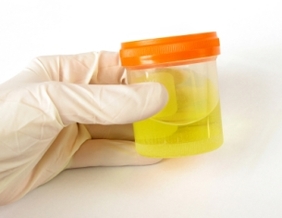
Urination, also known as micturition, voiding, peeing, and more rarely, emiction, is the process of disposing of urine from the urinary bladder through the urethra to the outside of the body. Urine is mostly composed of water (>95%) with urea (9.3 g/L), chloride (1.87 g/L), sodium (1.17 g/L), potassium (0.750 g/L), creatinine (0.670 g/L) and other inorganic and organic compounds. Normal urine is also straw-yellow in color. A strong ammonia smell and dark yellow to urine often indicates simple dehydration, but foul smell and cloudy appearance can also indicate bacterial infection. Other strong urine smells are caused by certain foods such as asparagus, or by medications or vitamins. In uncontrolled diabetes, urine has a sweet odor. Musty-smelling urine could indicate thyroid disease or other metabolic disorders. A burned caramel smell to urine is caused by a rare condition - maple syrup urine disease.
